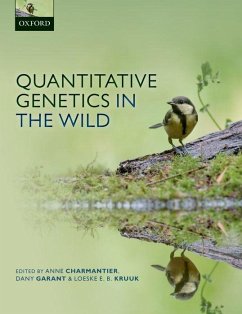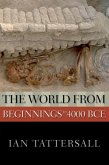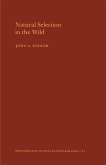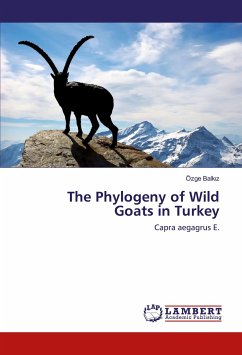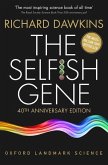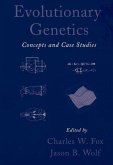Quantitative Genetics in the Wild
Herausgeber: Charmantier, Anne; Kruuk, Loeske E B; Garant, Dany
Quantitative Genetics in the Wild
Herausgeber: Charmantier, Anne; Kruuk, Loeske E B; Garant, Dany
- Gebundenes Buch
- Merkliste
- Auf die Merkliste
- Bewerten Bewerten
- Teilen
- Produkt teilen
- Produkterinnerung
- Produkterinnerung
This book gathers the expertise of 30 evolutionary biologists from around the globe to highlight how applying the field of quantitative genetics - the analysis of the genetic basis of complex traits - aids in the study of wild populations.
Andere Kunden interessierten sich auch für
![The New Foundations of Evolution The New Foundations of Evolution]() Jan SappThe New Foundations of Evolution54,99 €
Jan SappThe New Foundations of Evolution54,99 €![The World from Beginnings to 4000 BCE The World from Beginnings to 4000 BCE]() Ian TattersallThe World from Beginnings to 4000 BCE25,99 €
Ian TattersallThe World from Beginnings to 4000 BCE25,99 €![Natural Selection in the Wild Natural Selection in the Wild]() John A. EndlerNatural Selection in the Wild77,99 €
John A. EndlerNatural Selection in the Wild77,99 €![The Phylogeny of Wild Goats in Turkey The Phylogeny of Wild Goats in Turkey]() Özge Balk zThe Phylogeny of Wild Goats in Turkey33,99 €
Özge Balk zThe Phylogeny of Wild Goats in Turkey33,99 €![The Selfish Gene The Selfish Gene]() Richard DawkinsThe Selfish Gene12,49 €
Richard DawkinsThe Selfish Gene12,49 €![Evolutionary Genetics Evolutionary Genetics]() Charles W. Fox / Jason B. Wolf (eds.)Evolutionary Genetics90,99 €
Charles W. Fox / Jason B. Wolf (eds.)Evolutionary Genetics90,99 €![Why Humans Cooperate Why Humans Cooperate]() Natalie HenrichWhy Humans Cooperate63,99 €
Natalie HenrichWhy Humans Cooperate63,99 €-
-
-
This book gathers the expertise of 30 evolutionary biologists from around the globe to highlight how applying the field of quantitative genetics - the analysis of the genetic basis of complex traits - aids in the study of wild populations.
Hinweis: Dieser Artikel kann nur an eine deutsche Lieferadresse ausgeliefert werden.
Hinweis: Dieser Artikel kann nur an eine deutsche Lieferadresse ausgeliefert werden.
Produktdetails
- Produktdetails
- Verlag: Oxford University Press
- Seitenzahl: 294
- Erscheinungstermin: 3. Juni 2014
- Englisch
- Abmessung: 253mm x 195mm x 20mm
- Gewicht: 826g
- ISBN-13: 9780199674237
- ISBN-10: 019967423X
- Artikelnr.: 40137787
- Herstellerkennzeichnung
- Libri GmbH
- Europaallee 1
- 36244 Bad Hersfeld
- gpsr@libri.de
- Verlag: Oxford University Press
- Seitenzahl: 294
- Erscheinungstermin: 3. Juni 2014
- Englisch
- Abmessung: 253mm x 195mm x 20mm
- Gewicht: 826g
- ISBN-13: 9780199674237
- ISBN-10: 019967423X
- Artikelnr.: 40137787
- Herstellerkennzeichnung
- Libri GmbH
- Europaallee 1
- 36244 Bad Hersfeld
- gpsr@libri.de
Dr Anne Charmantier is an evolutionary ecologist working for the CNRS in Montpellier, France. Her research interests are centered on understanding the evolutionary mechanisms underlying variation in life-history and behavioural traits in natural populations. She particularly focuses on the role of environmental degradation; this degradation can be internal (i.e. senescence); or external (changes in the environment, including those induced by man). During her PhD in behavioural ecology in Montpellier, she discovered quantitative genetics while working with Loeske Kruuk in Edinburgh. She then spent three years as a postdoc in the University of Oxford before taking up a CNRS position in Montpellier to study evolutionary processes in bird populations. In 2011, she received the CNRS Bronze Medal. She is associate editor of the journals Evolution and Proceedings of the Royal Society B and currently holds an ERC Starting Grant. Dr Dany Garant is Professor of Biology at the Université de Sherbrooke, Canada. His research program is focussed on understanding the factors shaping the adaptive potential of wild animal populations that face changing environmental conditions by assessing both their evolutionary potentials and their phenotypic plasticity. After completing his PhD at Université Laval, where he worked on the molecular ecology of salmonids, he moved to Oxford University where he was a NSERC postdoctoral researcher, working on evolutionary quantitative genetics of birds. After this postdoc he was hired by the Université de Sherbrooke where he established a research group working on these areas of research. He has published several articles in the field of quantitative genetics in the wild and he currently serves as an associate editor for Molecular Ecology. Dr Loeske E. B. Kruuk is Professor of Evolutionary Ecology at the University of Edinburgh, UK. Her research interests are focused on how evolutionary and ecological processes shape biological diversity in wild animal populations. After an undergraduate degree in mathematics, she realized that biology was more interesting and so did a PhD in population genetics at the University of Edinburgh. Her interest in quantitative genetics began during a postdoctoral position at the University of Cambridge, after which she returned to Edinburgh on a Royal Society University Research Fellowship. She has been involved with many long-term studies of wild animal populations, but with a bias towards Scottish ungulates and, more recently, Australian passerines: these have allowed her to investigate a range of issues such as quantitative genetics, the effects of climate change, senescence, phenotypic plasticity, natural and sexual selection, inbreeding depression and maternal effects.
* 1: Introduction
* 2: Four decades of estimating heritabilities in wild vertebrate
populations
* 3: Quantitative Genetic Approaches to Understanding Sexual Selection
and Mating System Evolution in the Wild
* 4: Individual behaviour: behavioural ecology meets quantitative
genetics
* 5: The quantitative genetics of senescence in wild animals
* 6: The effects of others' genes: maternal and other indirect genetic
effects
* 7: Dominance genetic variance and inbreeding in natural populations
* 8: Cross-pollination of plants and animals: wild quantitative
genetics and plant evolutionary genetics
* 9: Quantitative genetics of wild populations of arthropods
* 10: Case study: quantitative genetics and sexual selection of
weaponry in a wild ungulate
* 11: Epigenetic processes and genetic architecture in character
origination and evolution
* 12: Evolutionary potential and constraints in wild populations
* 13: Molecular quantitative genetics
* 14: Bayesian approaches to the quantitative genetic analysis of
natural populations
* 15: Evolutionary dynamics in response to climate change
* 2: Four decades of estimating heritabilities in wild vertebrate
populations
* 3: Quantitative Genetic Approaches to Understanding Sexual Selection
and Mating System Evolution in the Wild
* 4: Individual behaviour: behavioural ecology meets quantitative
genetics
* 5: The quantitative genetics of senescence in wild animals
* 6: The effects of others' genes: maternal and other indirect genetic
effects
* 7: Dominance genetic variance and inbreeding in natural populations
* 8: Cross-pollination of plants and animals: wild quantitative
genetics and plant evolutionary genetics
* 9: Quantitative genetics of wild populations of arthropods
* 10: Case study: quantitative genetics and sexual selection of
weaponry in a wild ungulate
* 11: Epigenetic processes and genetic architecture in character
origination and evolution
* 12: Evolutionary potential and constraints in wild populations
* 13: Molecular quantitative genetics
* 14: Bayesian approaches to the quantitative genetic analysis of
natural populations
* 15: Evolutionary dynamics in response to climate change
* 1: Introduction
* 2: Four decades of estimating heritabilities in wild vertebrate
populations
* 3: Quantitative Genetic Approaches to Understanding Sexual Selection
and Mating System Evolution in the Wild
* 4: Individual behaviour: behavioural ecology meets quantitative
genetics
* 5: The quantitative genetics of senescence in wild animals
* 6: The effects of others' genes: maternal and other indirect genetic
effects
* 7: Dominance genetic variance and inbreeding in natural populations
* 8: Cross-pollination of plants and animals: wild quantitative
genetics and plant evolutionary genetics
* 9: Quantitative genetics of wild populations of arthropods
* 10: Case study: quantitative genetics and sexual selection of
weaponry in a wild ungulate
* 11: Epigenetic processes and genetic architecture in character
origination and evolution
* 12: Evolutionary potential and constraints in wild populations
* 13: Molecular quantitative genetics
* 14: Bayesian approaches to the quantitative genetic analysis of
natural populations
* 15: Evolutionary dynamics in response to climate change
* 2: Four decades of estimating heritabilities in wild vertebrate
populations
* 3: Quantitative Genetic Approaches to Understanding Sexual Selection
and Mating System Evolution in the Wild
* 4: Individual behaviour: behavioural ecology meets quantitative
genetics
* 5: The quantitative genetics of senescence in wild animals
* 6: The effects of others' genes: maternal and other indirect genetic
effects
* 7: Dominance genetic variance and inbreeding in natural populations
* 8: Cross-pollination of plants and animals: wild quantitative
genetics and plant evolutionary genetics
* 9: Quantitative genetics of wild populations of arthropods
* 10: Case study: quantitative genetics and sexual selection of
weaponry in a wild ungulate
* 11: Epigenetic processes and genetic architecture in character
origination and evolution
* 12: Evolutionary potential and constraints in wild populations
* 13: Molecular quantitative genetics
* 14: Bayesian approaches to the quantitative genetic analysis of
natural populations
* 15: Evolutionary dynamics in response to climate change

